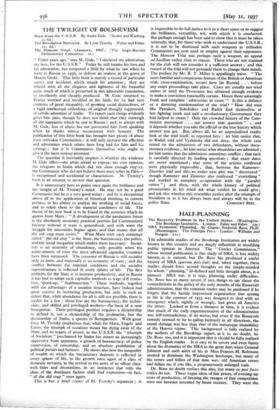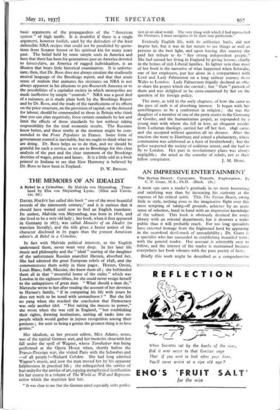HALF-PLANNING
The Recovery Problem in the United States. (Washington : The Brookings Institution. London : Faber and Faber. i5s.) NRA Economic Planning. By Charles Frederick Roos, Ph.D. (Bloomington : The Principia Preis. London : Williams and Norgate. 21s.)
THE admirable studies of the Brookings Institution are widely known in this country and are deeply influential in moulding
public opinion in America. The " Cowles .Commission," whose second publication- is this study of NRA, is less widely known, as is natural, but Dr. Roos has produced .a useful
history of NRA (quorum pars fiat) and, taken together, these studies should force second thoughts on the simple-minded for whom " planning," ill-defined and little thought about, is a
panacea. NRA was, it is true, planning under difficulties. Dr. Roos has so many severe, if just, things to say about the contradictions in the policy of the early months of the Roosevelt administration, that the common reader may be pardoned if he forgets that the hastily improvised organisation that sprang
to life in the summer of 1933 was designed to deal with an emergency which, rightly or wrongly, had given all America the jitters. Looked at from a distance in time, it is evident that much- of the early experimentation of the administration was self-contradictory, if no worse, but even if the Roosevelt
remedy seemed to be to gallop furiously- in all directions, the moral damage was less than that of the statuesque immobility
of the Hoover regime. This background is ftilly realised by
the authors of the Brookings report, as it is, no doubt, by Dr. Roos too, and it is important that it should be fully realised by the English reader. It is easy to be severe and even funny about the dramatics of the NRA in the great days when General Johnson and such aides of his as Miss Frances M. Robinson seemed to dominate the Washington landscape, but many of
the errors and follies of that time wet,: old American errors and follies on, if you like, a preposterously enlarged scale.
Dr. Roos no doubt realises this also, but many ex post facto critics do not. Those vague ideas of fair prices, of evening-up costs of production, of limiting the ravages of free competition
were not heresies invented by brain trusters. They were the
basic arguments of the propagandists of the " American system " of high tariffs. It is doubtful if there is a single argument, however foolish, used by the defenders of the least defensible NRA =cities that could not be paralleled by quota- tions from Senator Smoot or his spiritual kin for. many years past. The belief held by some simple souls in America and here that there has been for generations past an America devoted to laissez-faire, an America of rugged individualism, is an illusion that bears little historical examination. It is unfortu- nate, then, that Dr. Roos does not always emulate the studiously neutral language of the Brookings report, and that that acute sense of realism that animates his strictures on NRA is not always apparent in his allusions to pre-Roosevelt America or to the possibilities of a capitalist society in which monopolies are made ineffective by simple " controls." NRA was a good deal of a nuisance, as is made plain both by the Brookings Report and by Dr. Roos, and the study of the ramifications of its effects on the price structure, on the provision of capital, on the demand for labour; should be commended to those in Britain who think that you can plan negatively, force certain standards by law and limit the effects of those standards by law without taking responsibility for the total economic results. The Russians know better, and these truths at the moment might be com- mended to the Front Populaire in France. Some form of government control is inevitable, but we ought to think what we are doing. Dr. Roos helps us to do that, and we should be grateful for such a service, as we are to Brookings for this clear analysis of the past and the clear statement of the Brookings doctrine of wages, prices and hours. It is a little odd in a book printed in Indiana to see that New Harmony is believed by
Dr. Roos to have been in England.
D. W. BROGAN.















































 Previous page
Previous page